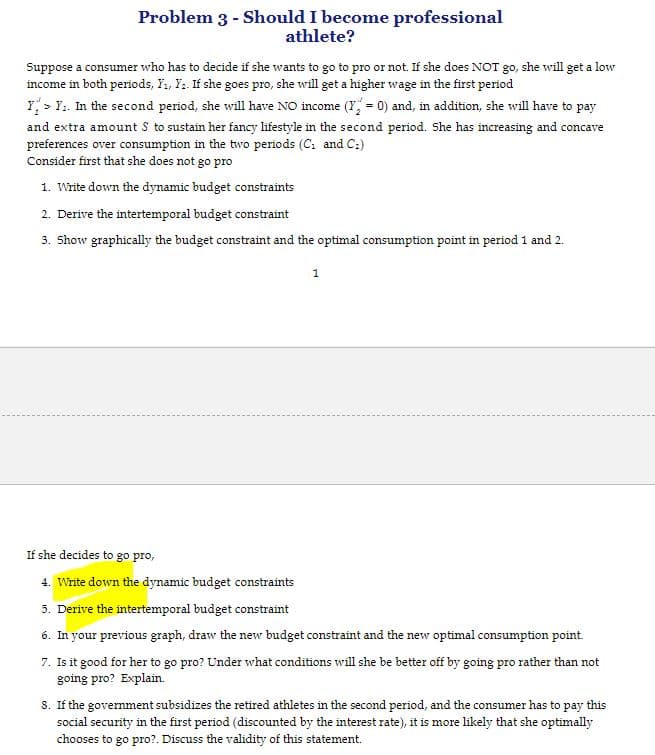Problem 3 - Should I become professional athlete? Suppose a consumer who has to decide if she wants to go to pro or not. If she does NOT go, she will get a low income in both periods, Y., Y. If she goes pro, she will get a higher wage in the first period r> T:. In the second period, she will have NO income (Y = 0) and, in addition, she will have to pay and extra amount S to sustain her fancy lifestyle in the second period. She has increasing and concave preferences over consumption in the two periods (C1 and C:) Consider first that she does not go pro 1. Write down the dynamic budget constraints 2. Derive the intertemporal budget constraint 3. Show graphically the budget constraint and the optimal consumption point in period 1 and 2. 1
Problem 3 - Should I become professional athlete? Suppose a consumer who has to decide if she wants to go to pro or not. If she does NOT go, she will get a low income in both periods, Y., Y. If she goes pro, she will get a higher wage in the first period r> T:. In the second period, she will have NO income (Y = 0) and, in addition, she will have to pay and extra amount S to sustain her fancy lifestyle in the second period. She has increasing and concave preferences over consumption in the two periods (C1 and C:) Consider first that she does not go pro 1. Write down the dynamic budget constraints 2. Derive the intertemporal budget constraint 3. Show graphically the budget constraint and the optimal consumption point in period 1 and 2. 1
Chapter7: Uncertainty
Section: Chapter Questions
Problem 7.7P
Related questions
Question

Transcribed Image Text:Problem 3 - Should I become professional
athlete?
Suppose a consumer who has to decide if she wants to go to pro or not. If she does NOT go, she will get a low
income in both periods, Y., Y. If she goes pro, she will get a higher wage in the first period
r> T:. In the second period, she will have NO income (Y = 0) and, in addition, she will have to pay
and extra amount S to sustain her fancy lifestyle in the second period. She has increasing and concave
preferences over consumption in the two periods (C1 and C:)
Consider first that she does not go pro
1. Write down the dynamic budget constraints
2. Derive the intertemporal budget constraint
3. Show graphically the budget constraint and the optimal consumption point in period 1 and 2.
1
If she decides to go pro,
4. Write down the dynamic budget constraints
5. Derive the intertemporal budget constraint
6. In your previous graph, draw the new budget constraint and the new optimal consumption point.
7. Is it good for her to go pro? Under what conditions will she be better off by going pro rather than not
going pro? Explain.
8. If the government subsidizes the retired athletes in the second period, and the consumer has to pay this
social security in the first period (discounted by the interest rate), it is more likely that she optimally
chooses to go pro?. Discuss the validity of this statement.
Expert Solution
This question has been solved!
Explore an expertly crafted, step-by-step solution for a thorough understanding of key concepts.
This is a popular solution!
Trending now
This is a popular solution!
Step by step
Solved in 2 steps with 1 images

Knowledge Booster
Learn more about
Need a deep-dive on the concept behind this application? Look no further. Learn more about this topic, economics and related others by exploring similar questions and additional content below.Recommended textbooks for you


Managerial Economics: A Problem Solving Approach
Economics
ISBN:
9781337106665
Author:
Luke M. Froeb, Brian T. McCann, Michael R. Ward, Mike Shor
Publisher:
Cengage Learning


Managerial Economics: A Problem Solving Approach
Economics
ISBN:
9781337106665
Author:
Luke M. Froeb, Brian T. McCann, Michael R. Ward, Mike Shor
Publisher:
Cengage Learning